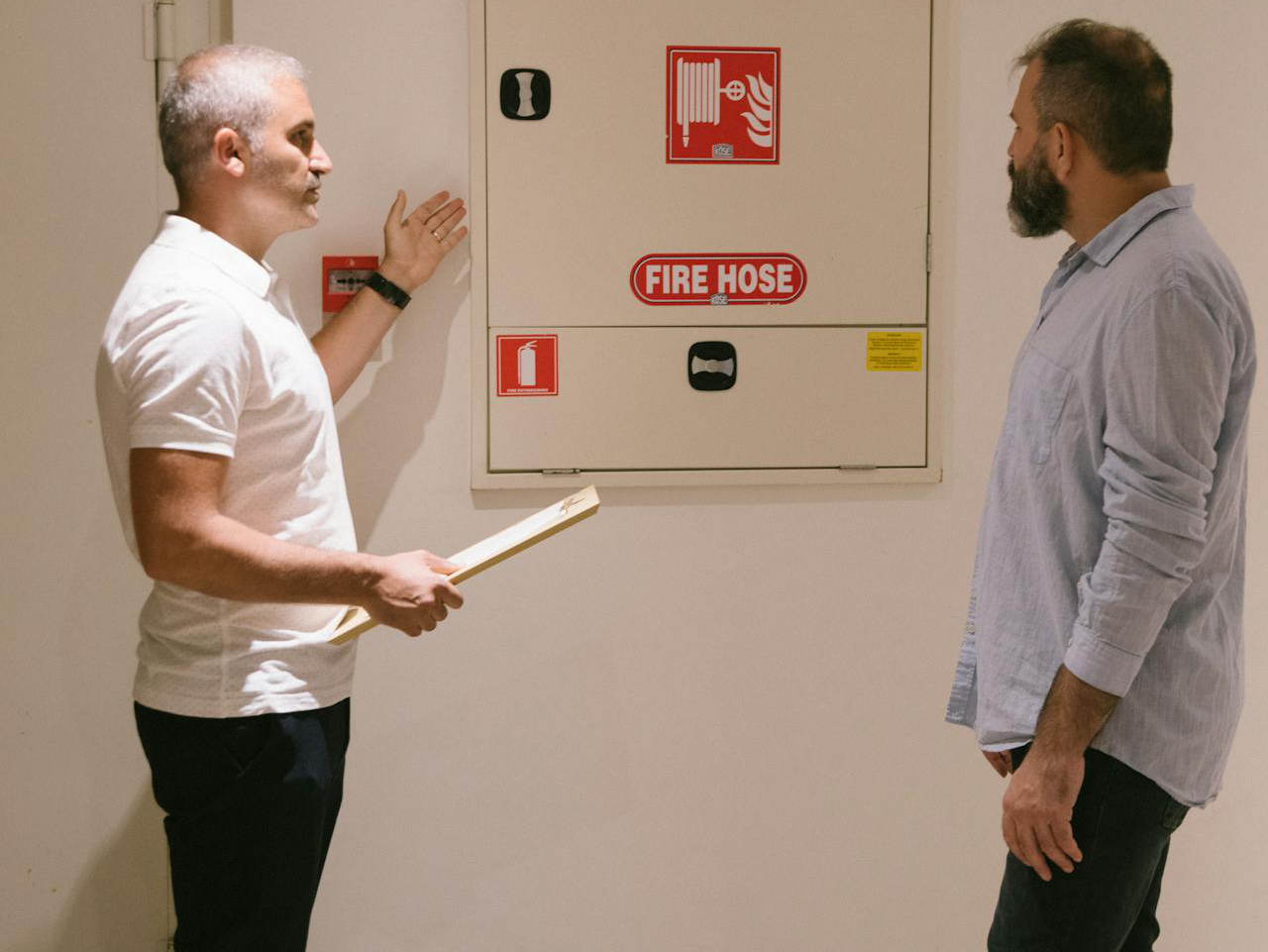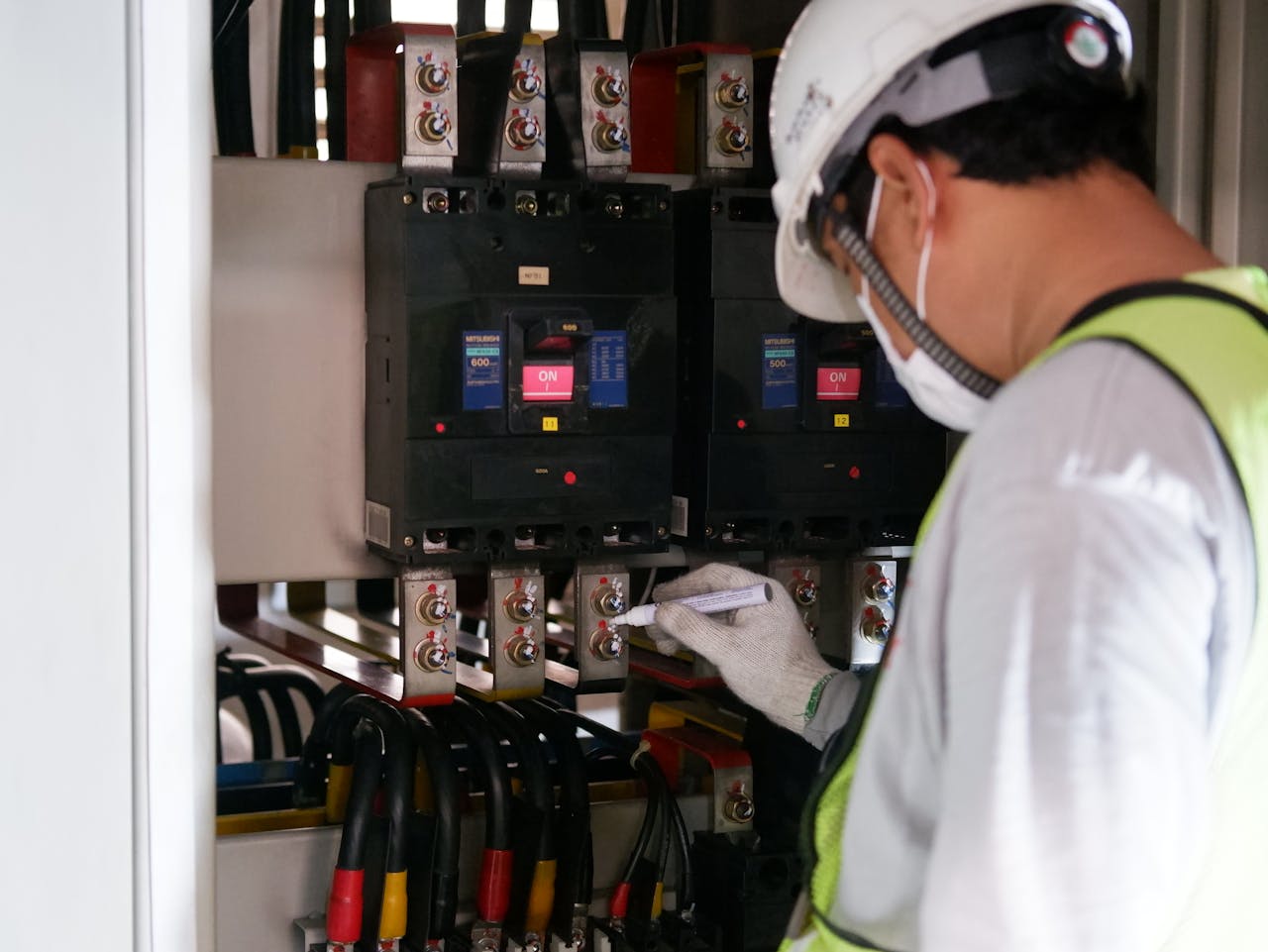The Skills Crisis: How Apprenticeships Can Help Solve the Fire and Security Industry’s Talent Gap
June 5, 2025
1
min read

The fire and security industry in the UK and Ireland is at a pivotal moment. Skilled engineers are retiring, and there aren’t enough new ones to replace them - in fact, the Construction Industry Training Board (CITB) says that over 250,000 extra construction workers will be required by 2028 to meet demand.
So how can companies find and retain talent to build the next generation of fire and security professionals? The answer, according to our first podcast guests, lies in apprenticeships.
In our first episode of The Blueprint, we sat down with David Scott, Managing Director of Skills for Security, a UK-based apprenticeship training organisation specialising in fire and security training, and James Moughton, Operations Director of Fisk Group, a South East-based fire and security company, to explore how apprenticeships can help solve the industry’s talent shortage.
The long-term value of apprenticeships
Many fire and security companies are beginning to use apprenticeships to upskill their workforce and introduce new perspectives. Both of our guests shared how apprenticeships are a smart investment that can be part of your long-term strategy for building experienced, loyal teams.
There are so many benefits to apprenticeships that make them a worthy part of your recruitment strategy:
Shape your team from day one
Apprenticeships allow you to train and develop young talent through the early stages of their careers, moulding them to fit your company’s culture, standards and values.
“You teach them the skills, and they then hopefully will go on and grow within the company,” James says. “Myself being an example - I started as an apprentice and worked my way up to a director.”
You can use apprenticeships to train new recruits in the skills you need in your business from day one, nurturing them and helping them to progress to more senior roles as they develop.
David says that when enterprise companies take on enough apprentices through Skills for Security, it allows them to be employer-led.
“They ultimately take on enough apprentices that they have a cohort full of their own team. That allows them to be very bespoke on the training requirements, but also they add quite innovative things around culture.
“So while they’re learning with us, they’re not just learning about the fire and security sector, they’re learning about what it means to work within that enterprise company culturally.”
Improve retention and morale
When you invest in apprenticeships, you’re more likely to retain your staff and have a happier team. Nurtured apprentices will stay loyal to you - in fact, the National Apprenticeship Service (NAS) says that 90% of apprentices stay at their company after completing their course.
James says the key to retaining apprentices is not to micromanage.
“We let people get on with their work - we manage when we need to… You don’t want someone breathing down your neck every second of the day.”
They also prioritise making Fisk Group a good place to work.
“We try to make it a fun environment. We do social things as much as we can - we do a summer BBQ every year.”
Teams who feel valued and rewarded for their hard work are more likely to stay for longer, saving you money in recruitment costs and training new staff.
Bring new perspectives to your team
Another huge benefit to hiring apprentices is that it helps you to diversify your team and the type of skills they have. While more experienced team members will be valuable in teaching your apprentices, younger workers can upskill senior staff too.
“Obviously the younger people in our company are better at using the tech,” says James.
“The older people have got the experience, so they learn off each other.”
The fire and security industry is changing from using pen and paper to using software solutions, so bringing fresh young workers into your company who can teach more seasoned staff members is crucial.
“I always joke when I speak to young people that you’re more likely to be holding a phone and a laptop these days than you are a toolbag!” says David.
Attracting young talent to the fire and security industry
Once you’re set on hiring apprentices, the next challenge is finding and keeping them. And contrary to popular belief, it’s not salary that’s the main driver for young workers, particularly Gen Z.
“We spoke to all of our learners about two or three years ago to find out what they’re looking for from their employer. Salary was actually way down the list,” says David.
“It was continuous professional development. It was feeling worthy and being appreciated.”
So while it’s important to pay a fair wage, if you want to attract and retain young talent, you need to prioritise continuous learning and show that you’re invested in your workers’ careers.
James says that younger workers expect a better work-life balance than generations before them, and it’s important for companies to allow for this.
“They don’t want to be working every hour under the sun like so many of the older engineers used to… They like to do their job, get home. And as long as they’re doing their job well, it’s important.”
Turning apprentices into long-term employees
It’s clear that apprentices care about professional development and furthering their careers. So once they’ve finished their apprenticeship, how do you keep them engaged with your company and prevent them from getting their heads turned?
Recognise success with incentives
David noted that Skills for Security’s six-monthly incentivised programme really works to help young people feel appreciated by and engaged with their employer.
The idea is that you set six-monthly KPIs for apprentices to aim towards in order to get certain incentives.
“If you can install a PIR [or] a fire detector by six months, then you get a tool bag [or] a multimeter,” says David.
“By the end of year one, if you can do X, Y and Z, then you get a works van [or] an extra day’s holiday, and it just continues every six months through the three-year programme.
“That alone motivates a young person to just keep going, stay focused and drive the right behaviours.”
Continue to invest in professional development
David is a strong advocate for putting your top talent back into higher level apprenticeship schemes to further improve their skills and show you’re invested in their learning.
“Put them on some sort of supervisory leadership management programme where that newly qualified apprentice is now the mentor for all the other apprentices in your business,” he says.
“Or give them some responsibility for running their own project and put them on a management apprenticeship, which lasts an additional 18 months. And just like that, you’ve managed to retain them in the business.”
David says that the businesses they recommend this strategy to have seen fantastic results.
“It’s changed the way they run their business. They see financial results, retention results, [and] it makes a person feel valued - therefore they stay longer.”
Read Skill for Security's Retention Roadmap.
Offer career progression for top talent
It’s crucial that your best apprentices have the opportunity to progress with your company if you want to retain them. Fisk Group believe in offering their top apprentices senior roles when they’ve successfully completed their training.
“We have got standout apprentices that we’ve had over the years and they move up the company really quickly,” says James.
“Our project supervisor, Ollie, is running all our large projects. He had the motivation and you could see straight away that he was going to be a leader.”
Having a track record of helping former apprentices rise through the ranks will only help you retain top talent as the newest recruits see that you truly invest in their future.
So, it’s clear to see that the fire and security industry is changing. The businesses that thrive over the next decade won’t be the ones scrambling to poach engineers from their competitors - it’ll be the ones who build their workforce and create an environment that people want to grow in.
Apprenticeships are a vital first step. But retaining young talent means giving them the tools, the trust and the roadmap to build a career.
As David put it, “The young people you're influencing now are the decision-makers of the future.”
Subscribe to The Blueprint wherever you get your podcasts:
- YouTube: https://youtube.com/playlist?list=PLxeCPJfHhKOTpB5KXvBTkl099uRetBVZ3&feature=shared
- Spotify: https://open.spotify.com/show/62Ex3q45oCM9XLEh2qmftF
- Apple: https://podcasts.apple.com/us/podcast/the-blueprint-by-uptick/id1812643798
- Amazon: https://music.amazon.com/podcasts/3745a8e2-ed0a-4deb-9a47-8d488853096a
Want to keep your apprentices for the long haul?
We’ve teamed up with Skills for Security to share their Apprentice Retention Roadmap, a practical guide packed with ideas to help you train, motivate, and keep your apprentices engaged.
Inside, you’ll find:
- Key insights on what really drives retention
- A step-by-step incentive scheme with milestone rewards
- Recommended apprentice pay rates
- Ideas for long-term development after qualification
It’s simple, actionable, and built on real experience with thousands of apprentices in the fire and security industry.
👉 Download it now and start the conversation in your business.
What is fire inspection software?
Fire inspection software is a digital tool that helps fire protection businesses complete, record, and manage inspections more efficiently. Instead of relying on paper checklists, technicians can use a mobile app to document assets, capture photos, log defects and generate professional reports on the spot.
How does fire inspection software work?
Fire inspection software programs such as Uptick allow technicians to complete inspections on-site using a tablet or phone, capture photos, log defects and generate instant reports. In the office, teams can schedule jobs, send quotes, track maintenance tasks and access real-time visibility across every building and asset. Fire inspection software systems bring your entire workflow together so nothing falls through the cracks.
Who uses fire inspection software?
Mainly fire inspection companies use fire safety software to coordinate inspections and maintain life-safety assets.
How does fire safety inspection software improve compliance?
Uptick ensures technicians follow the correct steps every time, reducing human error and creating consistent records aligned with standards. With asset-based inspections, automated reminders,a full audit history, and in-built compliance reporting, Uptick’s fire safety management software makes compliance easier for you and more transparent for your customers.
Can fire inspection software replace manual checklists?
Absolutely. Digital checklists, mobile inspection forms and automated workflows mean you no longer need printed paperwork. Using fire protection inspection software helps you avoid missing fields, lost forms and manual retyping, saving hours of manual work each week.
Can I customise inspection forms?
Yes. Uptick lets you customise forms to match your local standards, business processes and customer needs. With configurable templates and digital form builders, you can design exactly what your technicians need
How do I choose the best fire inspector software for my business?
Look for a platform built specifically for fire protection. Check ease of use, mobile performance, offline mode, compliance features, integration options and customer support. The best fire inspection software gives you room to grow, not just tools to get by.
How much does fire inspection software cost?
Our pricing model is based on a monthly pay-per-user fee. Customer and sub-contractor licenses are unlimited and free.
What else do you need to know?
How long does it take to get started with Uptick?
The biggest factors determining the length of the onboarding process are:
- The size of your team and their training requirements
- The quality and ease of export of your data
Most companies can get up and running within 2 months.
What platforms and devices does Uptick work on?
Uptick lives in the cloud. That means Uptick is available for your desk/office users on any device (Mac, PC or Linux) via your browser with no additional software downloads.
For your field licenses, on-site staff can use either Apple or Android devices. Our fire safety management app is available in the App store on Apple devices, and the Google Play store on Android devices.
How does Uptick compare to other products?
Uptick is the only modern cloud-based solution that is purposely built for the fire protection industry.
Many alternative solutions are either generic job management platforms that you will need to tailor to your business and/or do not have the same modern cloud-based capabilities.
How does Uptick protect and secure my data?
Uptick takes data security seriously. Our customers include some of the largest companies in the industry. As we work directly with government and banking clients we have have successfully passed through rigorous security auditing and penetration testing.
In addition to being secure, we work hard to provide a reliable service. Customers on Uptick can expect an uptime of 99.95% (including scheduled maintenance). This translates to an average of less than 5 minutes of business-hour downtime per month for office users and no downtime for technicians. If you're a large enterprise and want monetary guarantees around reliability, we offer dedicated hosting and Uptick Support SLAs.
How does Uptick pricing work?
Uptick charges a simple per-user monthly fee for each of your desk and field users. Customer and sub-contractor licenses are unlimited and free.


















.png)





